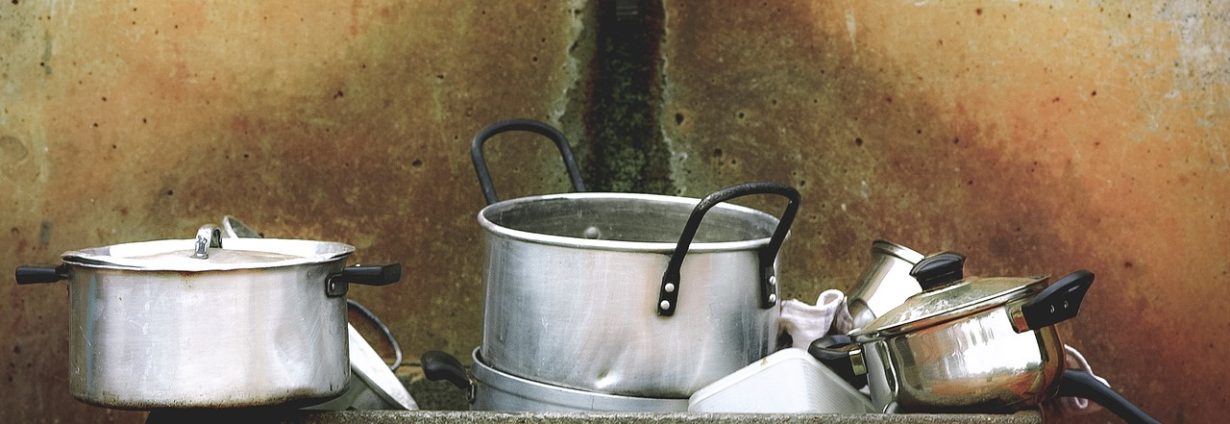DISHWASHERS
The very hot water and strong detergents used in a dishwasher makes this equipment highly susceptible to corrosion. Cleanliness is important to keep it in good condition.
Every two weeks the spray arm or arms should be removed – some lift out, others require the removal of screws. Use a pipe cleaner or similar to clean the ports. Scrub the filter screen (strainer) or basket with a stiff brush. Clean the tub of debris and wipe down the detergent dispenser and inside surfaces. In hard water areas, mineral deposits may form. These can be dissolved by pouring a cup of vinegar into the empty tub and running the machine through a full wash cycle. If the enamelled surface or racks show breaks, these must be treated immediately or rust will develop. Rub down with silicon carbide paper to remove any rust, prime and finish with an epoxy paint made for this purpose. (Spray packs may be used to obtain a smooth, even finish.) Do not try to simply cover the breaks up as this will exacerbate the problem.
IRONS
After using an iron, unplug and allow to cool before cleaning. If the steam vents become clogged, clear out the residue with a piece of wire such as a paper clip (taking care not to scratch the non-stick coating of the face), then fill the iron with a 50/50 mixture of water and white vinegar. Put the iron over the sink or a rack and operate on steam until it stops steaming. To prevent deposit build-up, use only distilled water, although rain water is usually all right. If the metal plate has been marked, it can be cleaned using an automobile polishing compound. Very fine steel wool may be required first. Do not use abrasive material on a non-stick surface.
IN THE KITCHEN
Aluminium saucepans can suffer from unsightly pitting corrosion. For cooking purposes, such saucepans should not be filled with water from the hot tap as this can contain a small but damaging amount of copper. Do not store or leave salty foods in aluminium saucepans for long periods. Acid fruits, especially rhubarb, should not be cooked or stored in such saucepans. As well as corroding the saucepan, the colour and taste of the fruit may be ruined.
Do not leave stainless steel cutlery wet for long periods at a time as it may become dull or spotted. Adding ammonia to the washing up water (2 tablespoons to 1 litre) occasionally, will help keep cutlery bright. Silver polish will clean stainless steel but ensure residues are cleaned off, washing warm soapy water after cleaning. Do not heat stainless steel cutlery in the oven. At temperatures above 200C, the metal may oxidise and become discoloured.
Do not allow the elements of electric toasters to become encrusted with bread crumbs or this may cause local overheating, leading to increased oxidation and reduced life of the element (caution: unplug the toaster before brushing crumbs off the element). Do not leave caustic oven cleaners on the inside of ovens. Any excess left behind will dry out when the oven is next used and may cause severe corrosion.
DOMESTIC PLUMBING
Whenever possible, avoid connecting dissimilar metals such as steel and copper or brass pipes. Under no circumstances should aluminium pipes or tanks be directly connected to steel, copper or brass pipes. Do not pour undiluted bleaches into sinks or basins. Undiluted, these chemicals can cause very severe corrosion of copper pipework. If you must dispose of bleaches, first dilute them with plenty of water, and flush thoroughly afterward with plenty of hot water.
Corrosion can occur in the hot water service tank, especially with impure water. Water filtration is the best way of minimising perforation of the water tank wall in these cases. Every six months or so, drain the water from the bottom of the hot water service until it becomes clear. Do not leave taps running or dripping as this accelerates failure of the washer or seat.
RUSTED NUTS AND BOLTS
If a nut or bolt is rusted or frozen, apply a penetrating oil or kerosene and let it sit for a few minutes and try again. Repeat the application if necessary. If it still will not budge, tap a groove in the edge with a cold chisel and hammer and hit the chisel in an anti-clockwise direction. If the nut still will not loosen, cut it through with the chisel or a hacksaw.
MISCELLANEOUS
An occasional rub over with an oil-soaked rag will greatly reduce corrosion of tools, garden implements and shears etc. Always clear the ashes away from under an open fire. This allows free movement of air to prevent the grate from overheating and minimise oxidation of the grate. Do not leave grass clippings on lawn mowers; always wipe them off after mowing. Wherever possible, used galvanised screws, nails, staples, etc. for garden gates and where water-based paints or fillers are used. If you use such paints or fillers with bare steel, ensure the steel is thoroughly primed and painted with rust-resistant paint beforehand. Where nail heads are causing rust stains, use sandpaper or steel wool to remove as much rust as possible. Sink each nail with a nail set and fill the holes with putty. Flat head nails will have to be thoroughly painted. Rust stains on concrete can be removed by a 50/50 mixture of water and hydrochloric acid.
ACA Educational Guide & Technical Bulletin
